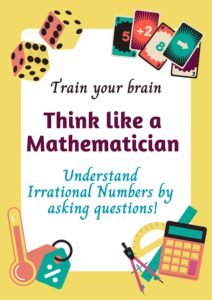
Mathematicians from India and across the world have been exploring Numbers and found various interesting concepts. The key traits of Mathematicians are “Observe and pose Questions – ask Why it works this way”
As part of the STEPS IN MATH learning program on Numbers, senior students of Grade 8 were having an activity to “Think Like Mathematicians!” and understand the world of Rational and Irrational numbers.
Below is a short excerpt on how students were encouraged to “Think like Mathematicians” and understand what are Irrational Numbers and how by asking questions they proved square root of 2 is an irrational number.
Educator: What kind of different numbers you can think of?
Students: Whole numbers, Fractions, negative numbers, decimals, Infinity, 0, etc..
Educator: What kind of different decimal numbers you can write
Students: 25.0, 0.84 , -0.65, 125.5, 0.3333333…. , 0.12121212….
Educator: Good collection of decimal numbers -terminating, recurring, repeating, negative decimal.
What about a decimal number which goes on and on without repeating in a pattern?
Student: Like 1.2345789234352436565….
Educator: Yes
Student: Is it possible to have such a number?
Educator: Ok, that’s a good question. Can you represent all possible decimal numbers you mentioned in fraction format (or as ratio of two numbers)
Student: Let’s try.
50/2, 84/100, -65/100, 1255/10, 1/3, 12/99
Educator: How can you represent a never ending decimal number which neither terminates nor recur?
Student: Thinking…
Educator: okay, let us find if there exists such a number in the world of numbers. What do you know about square numbers?
Student: when you multiply an integer with the its own, you get a square number like 4, 25, 100 etc
2 x 2 = 4
5 x 5 = 25
Educator: Yes, and what you know about square root?
Student: Hmm, sqroot of 16 is 4 meaning sqroot of a number say x, is the number say y, which when multiplied by itself (y x y) gives the original number x.
like 4 x 4 = 16, so square root of 16 is 4.
Educator: Can you try to find square root for other possible numbers?
Student: ok, so I can try square root of odd numbers, prime numbers, non-square numbers, decimal numbers
1. square root of 9 = 3 x 3 = 9. so square root of 9 is 3
2. square root of 7 = No two numbers can be multiplied to get 7, because it is prime! So don’t know how to find the value.
3. square root of 10 = only factor for 10 is 5 x 2, so same number are not multiplied to get 10!
4. square root of 6.25 = 2.5 * 2.5 = 6.25, so square root of 6.25 is 2.5 (I actually multiplied decimal number 2.5 by itself and found 6.25)
Educator: Based on your experiments, what do you observe?
Student: We can find sqroot value only for perfect square numbers and not for other numbers like 2, 5, 10 etc.
Educator: Can you not find any decimal number which when multiplied by itself gives a value 2? I think there can be a long decimal number which when multiplied itself gives a value 2.
Student 1: No, I think it cannot be.
Student 2: Yes, there could be..
Educator: Okay, now ask similar questions, observe number patterns, and properties when multiplication of a decimal number is done to itself and prove your statements!
Student:
3 x 3 = 9. Sqroot of 9 is 3
4 x 4 = 16. Sqroot of 16 is 4
sqroot of any whole number say number 10, between 9 and 16, should be a decimal number between 3 and 4.
Student tried to square different possible decimal number variations and found all of them will not give a whole number 10!
Like from 3.1 till 3.9, square of any decimal number will not give a Whole number! Please check the student work in next slide to prove this statement!

For example,
square of 3.1 is 9.61
square of 3.16 is 9.9856 (close but not exact 10!)
square of 3.162277 is 9.999995824729 (very close but not exact 10!)
So what ever long decimal we have after 3.162277….. it will still be a decimal number value close approximation to 10, but not exactly 10!
Such numbers like square root of 10 which do not have a specific value and therefore cannot be represented as terminating or recurring decimal and as a ratio are called Irrational numbers – namely numbers which
cannot be written as a ratio of two numbers!
Here are some interesting “Proof by Contradiction” written by students to prove Irrational numbers through the Inquiry way of asking questions.
Encourage your students & children to ask these questions and you will be amazed to see their involvement in learning, understanding and higher order thinking skills!
Below is the work of Nithilan, Grade 8 from Finland on his questions and proof for sqroot of non perfect square numbers to be irrational. He has used “Proof by Contradiction” method.
23.7.2023 Math journal + proof
Below is the work of Barathraam, Grade 8 from Chennai on his questions and proof for square root of non perfect square numbers to be irrational.
Please share your comments and feedback about this post on “Think like a Mathematician” activity
